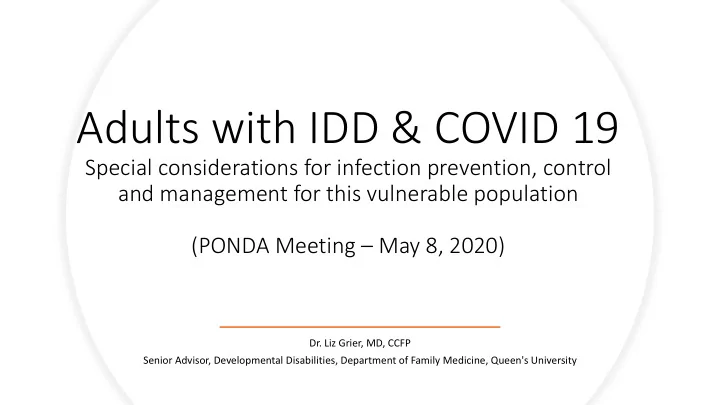

Adults with IDD & COVID 19 Special considerations for infection prevention, control and management for this vulnerable population (PONDA Meeting – May 8, 2020) Dr. Liz Grier, MD, CCFP Senior Advisor, Developmental Disabilities, Department of Family Medicine, Queen's University
• Increased risk of contracting COVID • Increased risk of severe illness with COVID -due to underlying respiratory disease Adults with IDD & -due to obesity, cardiovascular disease, diabetes COVID-19 -impact of premature aging -impact of not being able to report subjective symptoms of worsening illness • Increased risk of ED visits and hospitalizations for non-COVID issues during this time
• Prevention - often wheelchair bound, high level of contact for care, aerosol generating procedures (suctioning, CPAP/BIPAP, tracheostomy care, high Group 1 flow oxygen), source control is critical Patients with physical health conditions that • Symptomatic client or Positive case - easier to isolate in bedroom, handling a positive case in a put them at risk of shared room, determining contacts and defining serious illness with staff and other clients as exposed (public health COVID outbreak team) • Avoiding hospital/ER: availability of on call FMD/nurse, 'action plan' medications for recurrent infections in the home
• Infectious risk - be aware of the older patient with this profile (higher risk than younger patient), risk associated with obesity, Group 2 cardiovascular disease, diabetes associated with atypical antipsychotic use (optimize chronic disease) Patients with behaviours that challenge that can • Prevention - social distancing in the home as possible, adjust meal cause risk of harm to self routines, adjust client seating and flow through the home, regular handwashing, cleaning surfaces, source control or others and result in hospitalization or ED visits; • Symptomatic Client or Positive Case - public health to support also who cannot adapted approaches to PPE use and conservation, balance importance of isolating clients from each other with the risk of understand and carry out precipitating a behavioural exacerbation (resulting in social distancing/hygiene hospitalization/ER), high likelihood of clients already being significantly exposed • Avoiding hospital/ER: availability of on call psychiatry, PRNs filled and ready to use in the home
• Prevention: helping to understand social distancing, Group 3 supporting through withdrawal from substances, calling Patients with mild IDD who regularly to help with reduced contact with their friends, live independently and providing delivery of meds and groceries, risk reduction struggle with mental strategies (safe injection sites, providing a mask, hand sanitizer) health issues or addictions, may attend the ER and • Positive Case: supporting patient through forced quarantine other social settings should they get COVID/contact COVID (illness likely to be independently, mild and managed as an outpatient given this cohort is younger with less physical co-morbidity on average), still may go to ER frequently require close symptom monitoring, daily virtual/phone for issues best managed in check ins with nurse/MD primary care • Avoiding hospital/ER: on call crisis lines, checking in, on call FMD, proactive management of substance withdrawal
Canadian Family • https://www.cfp.ca/news/2020/04/09/04-09-02 Physician Journal Blog • Five key messages building on approaches used by public health to manage long term care and April 9, 2020 COVID 19 IPAC Ian Casson • intended as a communication piece to support Liz Grier developmental service agency and local public Bill Sullivan health unit collaboration Yona Lunsky
Adults with IDD living in congregate care (group homes) have similar medical and behaviour concerns to many long-term care residents despite their younger age. Key Message 1 Public health guidelines should provide for expedited assessment and enhanced follow-up for this group.
The direct care workers in group homes for adults with IDD are essential to their health care. Key Message 2 Protocols and protections, like those for essential health care workers, should be implemented.
Some adults with mild IDD living independently in the community are at risk of not understanding or adhering to public health guidelines. Key Message 3 Proactive communication and support (e.g. by phone) from knowledgeable social and health care providers is necessary to help them adhere to guidelines and manage during this difficult time.
Family caregivers, especially older parents, who live with and provide care for an adult with IDD, are at risk of severe COVID-related illness Key Message 4 themselves. A crisis plan needs to be in place to continue the care of their family member in that situation.
If an adult with IDD needs ED or other hospital services, family and other community-based caregivers need to ensure the hospital staff have the information about that individual to understand and support their communication and other special needs. Key Message 5 Decision making supports and advanced care plans are important, as is the awareness and accessibility of substitute decision makers.
Recommend
More recommend